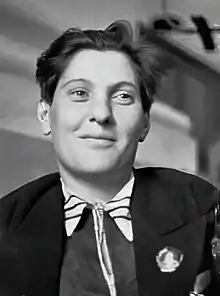Pasha Angelina
Praskovya "Pasha" Nikitichna Angelina (Russian: Праско́вья Ники́тична Анге́лина; December 30 [O.S. January 12] 1912 – 21 January 1959) was a celebrated Soviet udarnik and Stakhanovite at the time of the first Five Year Plans. She was recognized as one of the first female tractor-operators in the USSR and was made a symbol of the technically educated female Soviet worker.
Pasha Angelina | |
|---|---|
 | |
| Born | December 30 [O.S. January 12] 1912 Starobeshevo, Yekaterinoslav Governorate, Russian Empire |
| Died | 21 January 1959 (aged 46) Moscow, USSR |
| Awards | Hero of Socialist Labour (twice) |
Biography
Angelina came from Starobesheve, a village of Greek families who had moved to the region from the Crimea in the late 18th century, and she spoke both Greek and a local Turkic language; her father was a farmhand and her mother whitewashed huts.[1] In 1929, she started attending tractor-driving courses in her native oblast while also working at a dairy farm. In 1933, she organized an all-female tractor team that was reported to have achieved 129% of the quota and thus to have ranked first among the tractor teams of the region. She was made a celebrity, placed prominently in the media and depicted on propaganda posters. In 1935, she was among the "Champions of Agricultural Labour" selected to hold a conference with the leaders of the Party and state in the Kremlin. At that conference, she officially promised to organize 10 more female tractor teams in her raion. In 1938 she signed an appeal entitled "One hundred thousand (female) friends - onto the tractor!" (Russian: "Сто тысяч подруг - на трактор!"). Women shouldering work with tractors made it possible for more men to be drafted into the Soviet army before and during World War II. During the Second World War, Angelina studied agriculture in Moscow for two years and then worked as a team leader in Kazakhstan until the end of hostilities. After the war, she returned to work in the same function in Starobeshevo. In 1948, Angelina authored an autobiographical book, Lyudi kolkhoznykh polei ("The people of the kolkhoz fields").
Awards
Angelina was twice a Hero of Socialist Labor (1947, 1958), a recipient of the Stalin Prize (1946), and was bestowed three orders of Lenin and the Order of the Red Banner of Labour. She was also elected into the Supreme Soviet of the USSR in 1937, 1946 and 1950.
Sources
- Great Soviet Encyclopedia, 2nd edition.
- Great Russian Encyclopedia
References
- Sergei Tretyakov, «Девять девушек», Вчера и сегодня: очерки русских советских писателей, Vol. 1, p. 306; tr. as "Nine Girls," in James Von Geldern and Richard Stites (eds.), Mass Culture in Soviet Russia: Tales, Poems, Songs, Movies, Plays, and Folklore, 1917-1953 (Indiana University Press, 1995: ISBN 0-253-32893-4), p. 218.
- "Трактор и судьба".
External links
| Wikimedia Commons has media related to Pasha Angelina. |